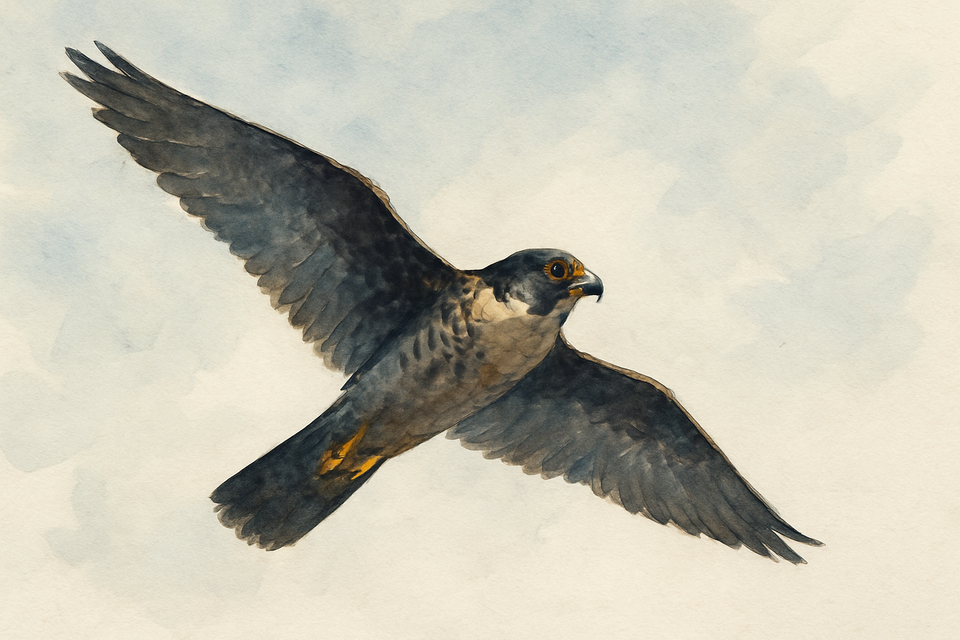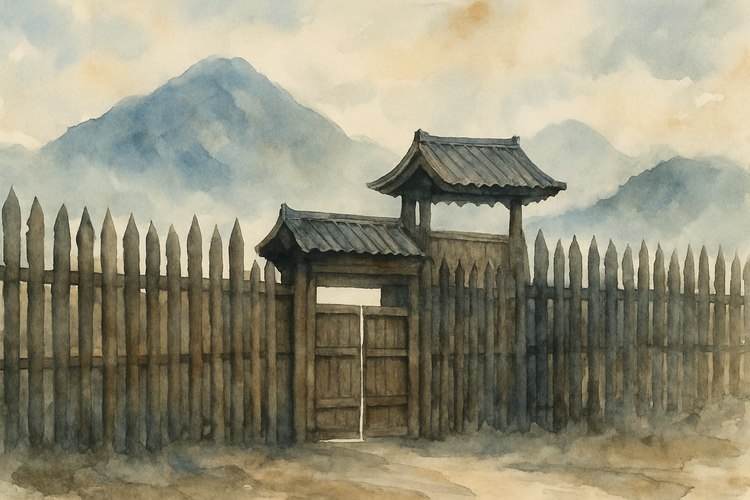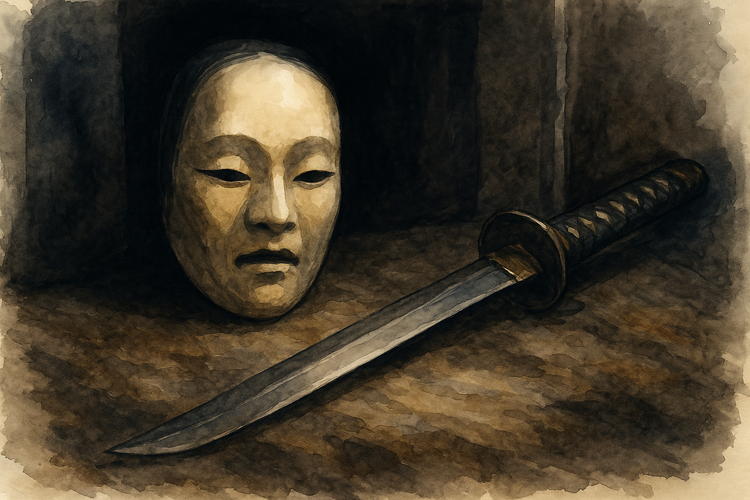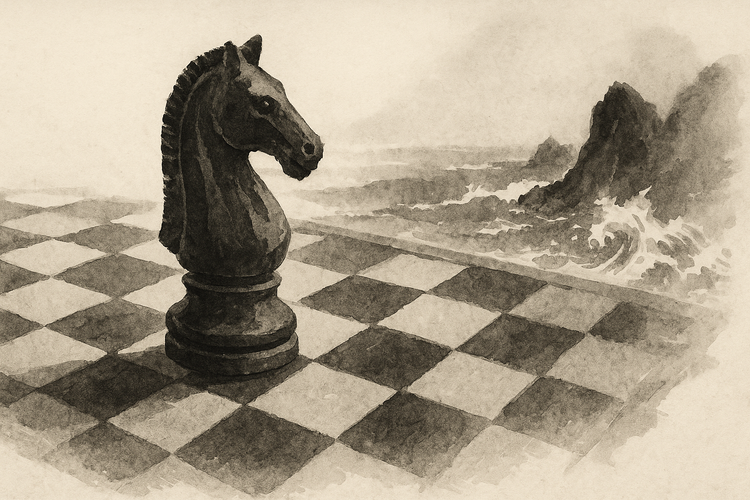Shōgun S1E1 "Anjin"

Extensive spoilers follow for Episode 1.
Adrift at the Edge of the World
The Erasmus comes into view more ruin than ship, a vessel worn down by storms and starvation. Once part of a fleet of five, it now drifts alone, a battered survivor carrying men who scarcely look human. Their bodies are wasted, their minds frayed, and below deck the air is thick with sickness and despair. The captain, raving and undone, ends his torment with a pistol shot — a single crack that leaves only silence and sea. Out of this fog of death and exhaustion, Japan waits ahead, not as rescue but as another test. The men who stagger toward its shore arrive already stripped of belonging, reduced to shadows before they have even set foot on foreign soil.
The Falcon and the Chamber
Far from the ruin of the Erasmus, the first image of Toranaga comes with wings slicing through the air. A falcon circles high above the fields, conserving its strength until the dive. When it strikes, it is swift and certain, a hunter that wastes nothing. Toranaga watches closely, the lesson clear: survival belongs to the one who waits unseen, who chooses the moment of dominance. In his gaze, the bird is more than sport — it is emblem, a living mirror of the patience and precision that power demands.
That same discipline follows him into the council chamber at Osaka. There, beneath the weight of ceremony and rivalry, Ishido demands that he surrender Lady Ochiba, threatening impeachment if he refuses. Voices rise around Toranaga, some in outrage, others in caution; seppuku is invoked as proof of loyalty, and honor hangs heavy in the air. Yet Toranaga remains measured, letting the room expend its energy while he conserves his own. Like the falcon he so admired, he circles, silent and watchful, a figure both central and precarious in the shifting winds of power.
The Pit and the Weight of Judgment
When the Erasmus makes landfall, its surviving crew are quickly overwhelmed by samurai and herded into a holding pit. The place is damp and confining, a rough pen that makes clear how little power they have left. The sailors, gaunt and bewildered, can only watch as their captors move with a discipline that is at once alien and absolute. For men who have already been unmoored by the sea, this new captivity drives them further into foreignness, marked now as outsiders in a land that offers no welcome.
It is John Blackthorne who feels the strangeness most acutely. Pulled into the open, he alone witnesses the sudden beheading of a Japanese serf — a flash of steel that leaves him stunned at its brutality. The act is not meant for him, yet its message is unmistakable: life here is held on a blade’s edge, belonging determined by codes he cannot yet grasp. When a Jesuit priest arrives to translate, John finds no relief; the man’s allegiance lies elsewhere, his words more manipulation than bridge. Surrounded by enemies, betrayed by language, John begins to see how completely alone he has become.
If the beheading revealed the swiftness of order, Lord Yabushige’s judgment showed something more unsettling. His punishment of a prisoner was not only an assertion of power but an indulgence of his own fascination with death — with the edge of the moment when life gives way to nothing. For Blackthorne and his crew, the lesson was chilling. Whatever fragile hope they may have carried ashore gave way to a deeper recognition: they were at the mercy of lords whose authority extended not just over life and death, but over the manner in which both might be experienced.
Mariko Between Worlds
The language of honor, voiced in the council chamber, soon makes itself felt in the household of the samurai who spoke out. Seppuku is granted, and the weight of that judgment presses down on his family. His wife, overcome, moves to take her own life in anguish. It is Mariko who steps forward, steady where others unravel, persuading her back from the edge. She cannot alter the fate already set in motion, but she can halt despair from claiming another.
What follows is never shown, only understood. The household yields to the demands of honor, and the silence around it is heavy. Here, belonging means surrender to custom, even when it cuts against the deepest of human bonds. Against this, Mariko stands as both participant and stranger — bound to these expectations yet marked by a foreign faith that keeps her always half apart.
Belonging as Utility
Even in ruin, the Erasmus carries weight. When Toranaga’s emissary arrives to claim the ship, it is not the sailors who matter but the guns fastened to its deck — foreign steel that can tilt the balance of power. The vessel is reduced to its parts, its value measured not in lives but in weapons, another piece to be shifted on the board of Osaka.
Yet in this accounting, John Blackthorne emerges as something more than cargo. His skill as a pilot — the one who can read seas, winds, and stars — makes him a figure of interest in his own right. When a storm threatens to drag their vessel under, it is he who takes the rudder, steadying the ship through chaos and giving Rodrigues a chance to survive by casting him an oar. Later, he finds the pilot washed ashore, battered but alive. In these moments, usefulness outweighs strangeness; John’s presence means survival. But the respite is short. His arrival in Osaka restores the imbalance, placing him once more in a city defined by ritual, suspicion, and intrigue.
It is here that Mariko first encounters him. Summoned into Toranaga’s service as translator, she becomes the voice that lends meaning to his strange speech, though her interpretations carry shades of her own intent. When Toranaga asks whether her Christian faith might stand in the way of loyalty, her answer is telling: she has more than one heart. The reply is at once defiance and devotion, an acknowledgment that belonging can be divided — that one may live between worlds without fully surrendering either.
The Savage Mirror
The episode closes with two figures newly drawn into each other’s orbit: Blackthorne, the shipwrecked pilot whose survival now depends on his foreign skill, and Mariko, the noblewoman whose foreign faith divides her loyalties. Around them stretches a world where belonging is never guaranteed — where the codes of honor demand blood, and usefulness can be the only shield against annihilation.
What gives the story its edge is not simply the strangeness of one culture to another, but the symmetry of that strangeness. In the pit, John and his captors both reach for the same word: savage. Each sees the other as alien, barbaric, less than human. Yet the more the episode unfolds, the more that mirror reflects inward, showing how belonging itself is fragile, built on violence, custom, and necessity. To be foreign in Shōgun is to be exposed. But to belong is no less perilous, for it can demand the surrender of everything — even one’s deepest bonds.



Comments ()